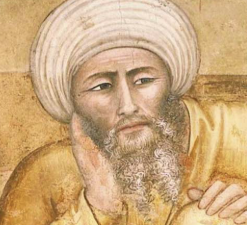
Averroes — The Philosopher of Reason and Reconciliation (1126–1198)
A jurist, physician, and philosopher of Al-Andalus who restored Aristotle to the world and defended the unity of truth across faith and reason.
Life in the Golden Age of Córdoba
Averroes (Ibn Rushd) was born in Córdoba, a flourishing intellectual center where poetry, science, and theology mingled freely. He descended from a prestigious family of judges, and his education spanned law, medicine, astronomy, theology, mathematics, and philosophy. His brilliance and clarity of thought led him to serve as both a chief judge and the personal physician to the Almohad caliphs.
His early work sought to bring order to Islamic jurisprudence, but his deeper passion lay in understanding the structure of reality. Inspired by Aristotle, he believed human reason was not a threat to revelation but one of its greatest allies. This conviction shaped the rest of his life’s work.
“Ignorance leads to fear, fear leads to hatred, and hatred leads to violence.”
The Great Commentator — Restoring Aristotle
Averroes wrote some of the most important philosophical works of the medieval world: his long, middle, and short commentaries on Aristotle. Many of Aristotle’s texts had been lost in Europe, misunderstood, or fragmentary. Averroes reconstructed them, clarified them, and expanded upon them with a rigor unmatched in any era.
These commentaries crossed into Latin and Hebrew translation, sparking revolutions in Christian and Jewish philosophy. Through them, he became known as “The Commentator” — the definitive interpreter of Aristotle for nearly half a millennium.
“Knowledge is the conformity of the intellect with what exists outside it.”
Faith and Reason — Two Paths, One Truth
One of Averroes’ most daring ideas was his claim that religion and philosophy are two complementary ways of approaching the same truth. Revelation guides the many; philosophical reasoning guides the few trained to follow intellectual demonstrations. Neither path contradicts the other when rightly understood.
His treatise “The Decisive Treatise” argued that the Qur’an itself encourages rational inquiry. This bold stance placed him at the center of debates about interpretation, authority, and the nature of truth.
“Truth does not contradict truth.”
The Unity of the Intellect
Averroes proposed that at the highest level of thinking, the human intellect is universal — shared across all people. Individual minds participate in a single, eternal intellect that processes abstract thought. This idea was controversial and sparked intense debates in universities from Paris to Padua.
His theory shaped medieval thought profoundly, influencing the great Scholastics and challenging theologians to refine their ideas about the soul and consciousness.
“The intellect is one and the same for all human beings.”
Exile, Suppression, and Posthumous Triumph
Toward the end of his life, political tides turned against philosophical inquiry. His books were banned and burned in Córdoba, and he was briefly exiled. The intellectual openness of Al-Andalus was collapsing. Yet his ideas survived through translation, moving across borders into Europe and the Mediterranean world.
Far from fading, his work ignited the rise of European Scholasticism and influenced Jewish luminaries like Maimonides. In many ways, Averroes became more famous after his death than during his life.
“When one is wise, the whole world becomes his homeland.”
Legacy
Averroes stands today as a bridge between civilizations — a thinker who connected the ancient with the medieval, the Islamic world with the Latin West, and revelation with rational analysis. His works shaped philosophers, theologians, and scientists for centuries.
His enduring message is that inquiry, courage, and intellectual honesty are forms of devotion, and that truth belongs to anyone willing to pursue it with discipline and openness.
“He who seeks truth must devote himself to the whole universe.”
CivilSimian.com created by AxiomaticPanic, CivilSimian, Kalokagathia
